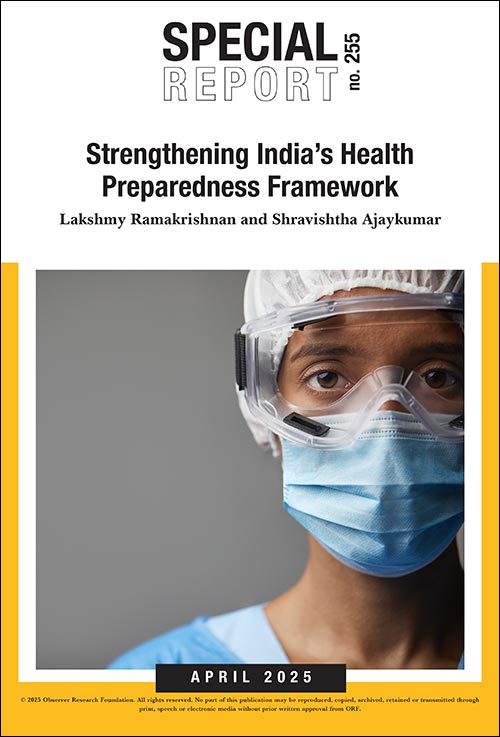
Image Source: Getty
Despite being in its early stages, Quantum Technology (QT) is poised to become a foundational technology in the future, much like semiconductors are today. Having firmly demonstrated its ability to master semiconductor technology, Taiwan is well-positioned to reiterate its status as a global leader in innovation by establishing a firm foothold in QT. Additionally, this presents India with a novel avenue to collaborate with Taiwan in this domain, allowing it to effectively bypass the hurdles posed by export controls put in place by leaders in the field, namely the United States (US) and China.
Taiwan’s Progress in Quantum Technology
Prioritising QT as a strategic focus, the Taiwan National Science and Technology Council (NSTC) established the Taiwan Quantum Program Office (TQPO) in 2021. NSTC, in collaboration with Academia Sinica and the Ministry of Economic Affairs, also created the National Quantum Team in 2022 with an investment of US$ 259 million over five years. The Team includes 72 subject matter experts and 24 companies, with representatives ranging from the private sector, the Taiwan authorities, academia, and research institutions. Its research focuses on universal quantum computer hardware technology, quantum optical technology, quantum software technology, and application development.
Taiwan is also pursuing quantum computing software and simulation through a strategic partnership between the Hon Hai Research Institute and Japan’s QunaSys.
Taiwan has already demonstrated prowess in quantum computing. In January 2024, Academia Sinica launched Taiwan’s first indigenously built quantum computer consisting of five superconducting qubits. In October 2024, a research team led by the Department of Physics at the National Tsing Hua University (NTHU) developed the world’s smallest quantum computer using a single photon. Furthermore, in November 2024, the Taiwan Semiconductor Research Institute (TSRI), a government-funded institute under the National Applied Research Laboratories (NARLabs), acquired a 5-qubit superconducting quantum computer, the IQM Spark, from IQM Quantum Computers (IQM), a Finnish quantum computing company. Taiwan is also pursuing quantum computing software and simulation through a strategic partnership between the Hon Hai Research Institute and Japan’s QunaSys.
Within the field of quantum communication, NTHU has successfully demonstrated Quantum Key Distribution (QKD) using a self-made single-photon source in 2019. The team worked on it further, which subsequently led to the creation of Taiwan’s first quantum secure communication network in 2023. Taiwan has also recognised the importance of migrating to Post-Quantum Cryptography (PQC), particularly in light of the increasing Chinese cybersecurity threat. Academia Sinica has been actively involved in PQC research. Chelpis Quantum Corp, a PQC research firm based in Taipei, has been recognised by the National Institute of Standards and Technology (NIST), which selected three of its algorithms in October 2024 to further its PQC standardisation process. Furthermore, Academia Sinica and Chelpis have been collaborating with the Netherlands via the Eindhoven University of Technology towards developing PQC since 2006. This has led to the establishment of the Chelpis Quantum Safe Migration Center in 2023, aimed at promoting international collaboration to accelerate research and to push PQC migration.
The Mutual Benefit from India-Taiwan Collaboration
QT collaboration between India and Taiwan possesses enormous potential, with both parties standing to gain significant benefits. India has been pursuing QT through its ambitious INR 6,000 crore (US$ 730 million) National Quantum Mission (NQM), which identifies quantum computing, quantum communication, quantum sensors, and quantum materials and devices as its four main pillars. Accordingly, the Government of India has established four Thematic Hubs (T – Hubs) at premier institutions across the country, which recently became operational.
The recent global push for establishing semiconductor supply chains independent of China has brought out the necessity for doing so in the case of other critical and emerging technologies as well.
The myriad of export controls implemented by the field’s leading countries, including the US, China, and most European Union (EU) nations, constitute India’s biggest obstacles to international collaboration in QT. Consequently, QT collaboration with Taiwan may offer a way out of this dilemma, provided both nations reach an understanding. Moreover, the recent global push for establishing semiconductor supply chains independent of China has brought out the necessity for doing so in the case of other critical and emerging technologies as well. Given that QT supply chains are not well established yet, cooperation between like-minded nations will ensure that the situation is not repeated. The US has already started pursuing this in Taiwan through the San Diego-based company, Quantum Design International, which has established Quantum Design Taiwan in Taipei, manufacturing dilution refrigerators, a critical component for quantum computing and quantum communication. Cooperation between India and Taiwan in establishing QT supply chains can, therefore, be extremely beneficial in the future.
In the case of Taiwan, the expertise it has developed in semiconductor technology has paid enormous dividends by providing it with significant economic leverage to ward off the constant threats from China. However, given the global push for establishing independent semiconductor supply chains, Taiwan stands to lose this advantage sooner rather than later. Establishing its roots in a foundational technology like QT can ensure it maintains its strategically important position in the future.
With India’s recent foray into semiconductors and its ensuing collaboration with Taiwanese companies such as Foxconn and Powerchip Semiconductor Manufacturing Corporation (PSMC), the Indian-Taiwanese technology cooperation has picked up steam.
Despite its recent attempts to develop the technology, Taiwan is still a relative newcomer in QT and stands to benefit from India’s experience in the field. Given Taiwan’s background in semiconductor technology, collaboration in developing quantum computers based on semiconductor qubits seems like an obvious choice for both nations. With India’s recent foray into semiconductors and its ensuing collaboration with Taiwanese companies such as Foxconn and Powerchip Semiconductor Manufacturing Corporation (PSMC), the Indian-Taiwanese technology cooperation has picked up steam. Furthermore, India has demonstrated its capabilities in QTs such as quantum communication and quantum sensing, aspects of QT yet to be advanced in Taiwan. The numerous potential applications of these technologies serve to provide even further motivation for Taiwan to pursue QT collaboration with India.
Possible Methods of Engagement
As a consequence of its novelty, research and development (R&D) is currently the focal point in the development of QT, which in turn requires significant investment and talent. Promoting joint R&D programmes is, therefore, of prime importance. The India-Taiwan Programme of Cooperation in Science and Technology was established in 2007 to provide financial support for R&D projects in areas like semiconductors, Artificial Intelligence (AI), biotechnology, and aerospace. Including QT within this framework would prove to be prudent, considering the Department of Science and Technology and NSTC are the nodal agencies for the programme. The aforementioned two agencies serve as the nodal agencies for quantum initiatives in their respective countries as well, namely, the NQM and National Quantum Team.
The India-Taiwan Programme of Cooperation in Science and Technology was established in 2007 to provide financial support for R&D projects in areas like semiconductors, Artificial Intelligence (AI), biotechnology, and aerospace.
Academic exchanges between institutions pursuing QT on either side would also be beneficial. For instance, exchange programmes between Taiwanese institutions like Academia Sinica and NTHU, and Indian institutions like the Indian Institute of Technology (IITs) and Indian Institute of Science (IISC) Bengaluru, would be particularly useful. This could be built along the lines of the already established Quantum Entanglement Exchange Programme between India and the US. It would also facilitate joint publications on QT between the two countries, which would accelerate the development of the technology.
The NSTC established the Taiwan Science and Technology Hub at Stanford University in 2023 to promote research, startups, and talent cultivation. It can consider doing the same in one of the aforementioned T–Hubs created under the NQM, with a specific focus on QT.
In the domain of PQC, India also possesses startups such as QNu Labs, which have done significant work in the field, similar to Chelpis in Taiwan. Business-to-business collaborations between these entities also present a viable opportunity for QT collaboration.
Conclusion
Formally established in 1995, the diplomatic relations between India and Taiwan remain relatively nascent. In this context, QT collaboration can have the added effect of strengthening the growing diplomatic relations and cooperation between the two. Leaders of both nations, including Indian Prime Minister Narendra Modi and former Taiwanese President Tsai Ing-wen, have acknowledged the importance QT holds for their respective nations. As such, both India and Taiwan are in an opportune position to further collaborate in this field, paving the way for stronger diplomatic ties in the future.
Prateek Tripathi is a Junior Fellow at the Centre for Security, Strategy and Technology, at the Observer Research Foundation.
The views expressed above belong to the author(s). ORF research and analyses now available on Telegram! Click here to access our curated content — blogs, longforms and interviews.




 PREV
PREV


